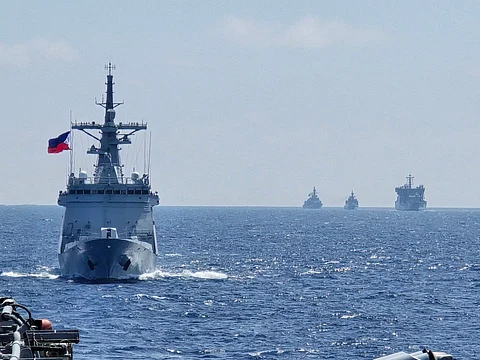
- NEWS
- the EDIT
- COMMENTARY
- BUSINESS
- LIFE
- SHOW
- ACTION
- GLOBAL GOALS
- SNAPS
- DYARYO TIRADA
- MORE

Photographs by Lade Kabagani for DAILY TRIBUNEABOARD BRP JOSE RIZAL — The two-day bilateral maritime cooperative activity (MCA) between the naval forces of the Philippines and India in the West Philippine Sea (WPS) continued unimpeded despite the presence of the People’s Liberation Army (PLA) Navy monitored in nearby waters.
The joint naval exercise began Sunday with the Philippine Navy deploying the BRP Jose Rizal and the BRP Miguel Malvar alongside the Indian Navy’s guided-missile destroyer INS Delhi, fleet tanker INS Shakti, and anti-submarine warfare corvette INS Kiltan.
At 1:52 p.m. on Sunday, while the vessels were sailing together toward the designated exercise area, a Philippine Air Force (PAF) C-208 detected the PLA-Navy Luyang class destroyer with bow number 161 at approximately 26 nautical miles (nm) of the Malvar.
At 2:57 pm, the PAF aircraft detected another PLA-Navy Jiangkai II class frigate with bow number 551 at approximately 24 nm.
At around 4 pm, the Chinese vessels became visible to the media embedded in the Jose Rizal while sailing off Cabra Island in Lubang, Occidental Mindoro.
The Chinese presence continued until the execution of the remaining maritime exercises on Monday afternoon.
Resounding success
Navy Lieutenant Jermin Roy Diaz, acting operations officer on the Jose Rizal, said all the scheduled joint naval drill activities were carried out as planned.
“Overall, the first Philippines-Indian maritime cooperative activity was considered a very successful one. All activities scheduled were conducted as planned, everything went well, and all the activities of the task force were met,” Diaz said.
The warships conducted air defense drills, photo and maneuvering exercises, rescue and man overboard operations, anti-submarine warfare training, at-sea replenishment, and a passing exercise.
The Chinese vessels distanced themselves from the Philippine Navy ships after the Indian Navy left the exercise area on Monday afternoon.
Like-minded nations
AFP Chief of Staff General Romeo Brawner Jr. lauded the successful completion of the historic maritime exercise with the Indian Navy in the WPS.
“The results were good. We met the objectives of the exercise and it was the first time in history that we had a maritime sail with the Indian Navy,” Brawner told reporters shortly before President Ferdinand R. Marcos Jr. departed for India on Monday.
“We are hoping this will continue so that we will have more exercises and maritime activities with the Indian Navy,” he added.
Brawner earlier emphasized that the exercise would mark a milestone in defense cooperation between the two nations, aimed at strengthening maritime security and interoperability in the Indo-Pacific region.
He said the first-ever Philippines-India MCA was finalized after discussions at the Raisina Dialogue 2025 in New Delhi held from 17 to 19 March.
Beijing has not publicly commented on the military drills, but it has routinely denounced Manila’s similar activities as interference by “outside powers.”
China maintains sweeping territorial claims in the South China Sea, including areas within the Philippines’ exclusive economic zone.
Consistent India support
India, meanwhile, has voiced consistent support for Manila in its maritime dispute with Beijing.
Indian External Affairs Minister Subrahmanyam Jaishankar reaffirmed New Delhi’s backing of the Philippines “for upholding its national sovereignty.”
China fumed after India voiced its support for the Philippines. Defense cooperation between the two nations has expanded in recent years.
In May last year, three Indian Navy warships made a port call in the Philippines, engaging in official discussions and cross-deck visits to boost interoperability.
A major milestone in the partnership came in 2023 when the Philippines became the first foreign recipient of India’s BrahMos supersonic cruise missiles as part of Manila’s military modernization efforts.
In April this year, Philippine Defense Secretary Gilberto Teodoro Jr. confirmed that a second batch of the BrahMos missiles—jointly developed by India and Russia—was expected to be delivered soon.
The growing India-Philippines security ties signal an increasingly strategic alignment as both nations navigate rising geopolitical tensions in the Indo-Pacific region.
The MCA comes as both Manila and New Delhi continue to face territorial disputes with China in their respective maritime domains.
